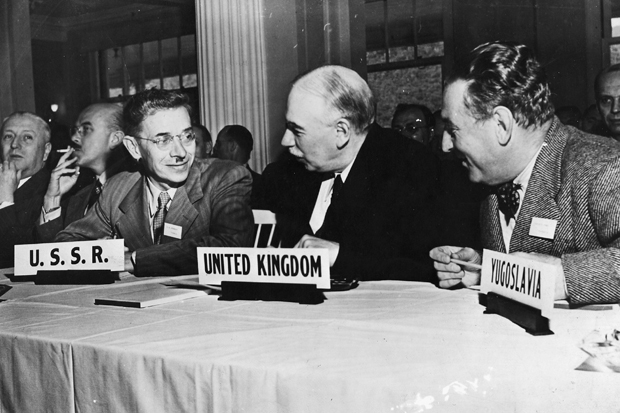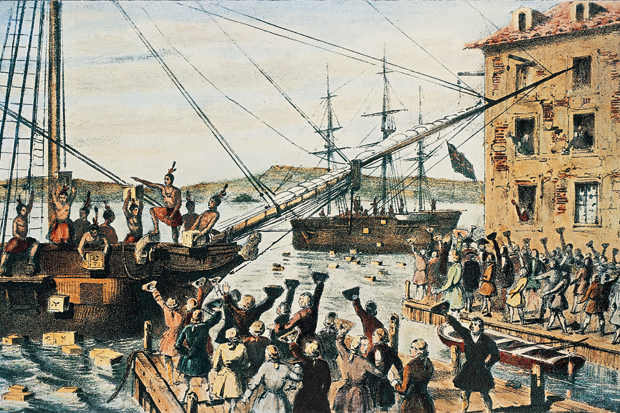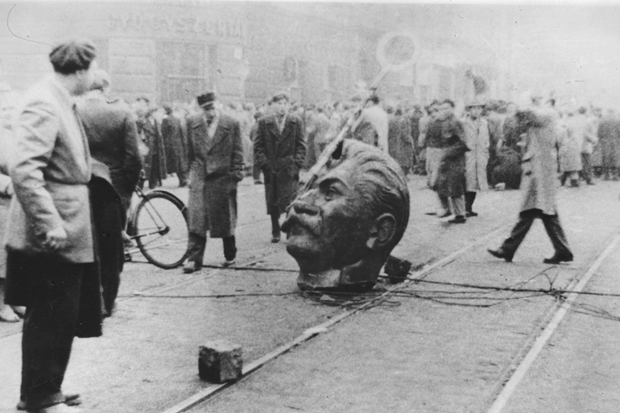There ought to be a comic opera about the Bretton Woods conference — Thomas Adès’s Powder Her Face, about Margaret, Duchess of Argyll, with its mordant libretto by Philip Hensher, should be the model. Everything about the conference was overdone. It was held in 1944 in the gargantuan Mount Washington Hotel in New Hampshire, which provided a preposterous background of gimcrack luxury. The arrangements were as farcically managed as the Atlanta Olympics. The boy scouts who were dragooned in to help run the conference would make a wonderfully playful chorus in the Adès-Hensher opéra bouffe.
There were 400 delegates from 77 countries — to say nothing of hundreds of slavering newshounds. They were assembled by President Roosevelt to agree the terms of two new global institutions, which became known as the International Monetary Fund and the World Bank. These bodies were to be charged with managing a global postwar financial system which would replace the unregulated disarray of prewar years. The IMF and World Bank schemes had been hammered out during 1943 by a small team of English negotiators, led by John Maynard Keynes, and by a vast battery of American experts headed by Harry Dexter White.
Notoriously Keynes and White had titanic confrontations. They baffled, exasperated and infuriated one another. Both men were under stress, for Keynes knew that he was dying of cardiac disease, and White was a spy supplying information to Soviet Russia. It is hugely to the credit of these incompatible men that, during a world war, they persuaded two imperial powers, whose long-term interests were irreconcilable, to reform global capitalism along lines that were not only interventionist and co-operative, but optimistic about the possibilities of human fulfilment.
Many of the Bretton Woods delegates did not speak or understand the conference language of English. Few understood global monetary and banking techniques in any argot. There were speeches of mind-numbing orotundity, interminable procedural rigmaroles, wrangles, schisms, informal parlays, tantrums. But there were also many moments of human greatness from Keynes, White and others. The leading participants were men of splendid intelligence and constructive imagination. Their brave and sturdy leadership upheld superb altruistic vision. Bretton Woods settled a postwar structure of world financial management that fostered the longest, most stable period of affluence in world history.
Although Ed Conway puts personalities and aggression at the forefront of his Bretton Woods story, he has done good work in archives on both sides of the Atlantic, and is a sure guide to the economic consequences of the conference. But the background details get smudged and the factual accuracy deteriorates as he hurries his narrative onwards in a blur of catchy phrases. Some of the hasty solecisms are hilarious. In one passage of scene-setting, Conway suggests weird feats of levitation by picturing Lawrence of Arabia and Emir Faisal of Saudi Arabia in a Paris hotel watching while ‘playwright Jean Cocteau and novelist Marcel Proust floated in and out of the lobby.’ In another passage, Conway implies that the last resort of British democracy was mime. When ministers and officials failed to reach consensus on policies, ‘the differences could be ironed out… in the library at the Athenaeum’, he claims, forgetting that there are ferocious ‘No Talking’ signs in that most august and Trappist of sanctuaries.
Conway is economics editor of Sky News, and a stalwart of Rupert Murdoch’s party lines. The Summit has too many anti-European jibes. Conway introduces Hitler’s economics minister, Funk, as ‘a squat, bald fellow with a penchant for cognac and young men’, says that it is ‘tempting’ to dismiss his plans for ‘a financial “New Order” stretching across a putative Nazi world’ as ‘the ravings of a deranged alcoholic’, and then adds, ‘squint a little, and you can see an early blueprint for the future economic shape of today’s European Union.’
The result is that readers of the thought-provoking epilogue to the book will discount the passages set on undermining the European single currency. Conway’s deference to media moguls is blatant — he even calls power-mad, destructive Lord Beaverbrook ‘charming’. He panders to American Republicans’ prejudices against Obamacare by complaining that ‘American money helped pay for social security, the National Health Service and widespread nationalisation of the British economy.’
He writes of the postwar Labour government: ‘Attlee would brutally strip down the military. Country by country, the empire would be discarded.’ But Britain’s military commitments needed drastic retrenchment — its pretensions to be a world power remained economically crippling for many decades — and it was later Conservative governments that implemented decolonisation.
And how strange to quote as if it was a radical new insight a remark of the current neo-Keynesian chief economist of the IMF: ‘I’m quite open to the idea that capital flows don’t always reflect good judgments on the part of investors. And some of the movements caused by those flows may be quite bad for economic welfare.’ Talk about the blindingly obvious.
The Summit will make a rattling good read for some blokes. Fewer women are likely to enjoy its punchy, alpha-male prose, but it is just the book for men who don’t want to forget about money on their summer holidays and like a bit of argy-bargy.
Got something to add? Join the discussion and comment below.
Get 10 issues for just $10
Subscribe to The Spectator Australia today for the next 10 magazine issues, plus full online access, for just $10.
Available from the Spectator Bookshop, £20. Tel: 08430 600033. Richard Davenport-Hines’s The Seven Lives of John Maynard Keynes will be published next year.
You might disagree with half of it, but you’ll enjoy reading all of it. Try your first month for free, then just $2 a week for the remainder of your first year.














Comments
Don't miss out
Join the conversation with other Spectator Australia readers. Subscribe to leave a comment.
SUBSCRIBEAlready a subscriber? Log in